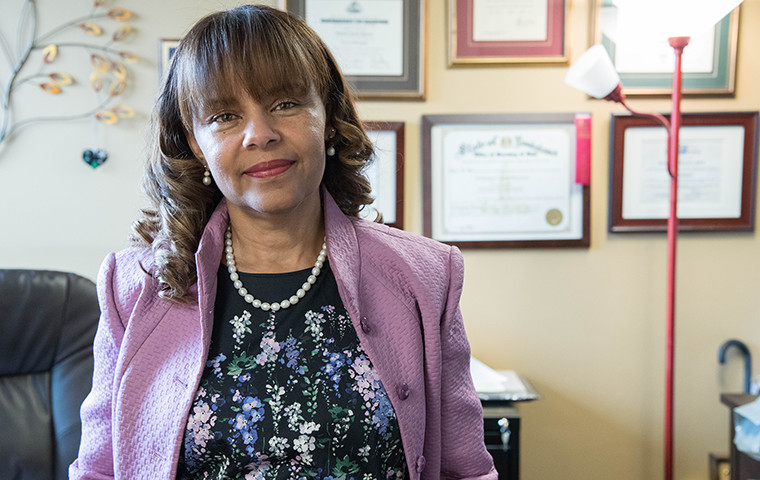
How to Lift the Stigma Around Mental Health?
Students and health professionals on the help available in times of need—and new efforts to get the word out.
It was parent orientation day at Santa Clara University, and a father raised his hand: “Can you talk about student mental health?” he asked.
A hush fell over the audience.
Jill Rovaris, director of SCU’s Cowell Center, stepped up to answer. Rovaris calmly explained that college can be overwhelming for some students—which is why the Cowell Center provides, in addition to medical care, psychological services.
What’s more, Rovaris said, Santa Clara is now a proud JED campus that is aggressively promoting the emotional well-being of all students.
“May I comment on his question?” inquired a sophomore standing in the back of the room. The All-American-looking young woman proceeded up to the stage and told the parents of her own struggle with anxiety and depression, how she tried to work through it, and finally met with a counselor at the center's Counseling and Psychological Services (CAPS) program who made all the difference in the world.
“I’m not ashamed to say it,” she said. “I just wanted you to know.”
It was a moment that reflected her courage and concern. And it’s a natural part of Santa Clara’s commitment to caring for the whole person.
End the Stigma
To help end the stigma surrounding mental health illness, the Cowell Center is planning a bold move this year by producing a series of posters featuring the faces and names of members of the SCU community. Each poster will include a personal message or well-known quote encouraging students to seek the help they may need.
Posters will be placed in residence halls, around Benson Memorial Center, in libraries and athletic facilities. Wherever students live, eat, study, or socialize, they’ll see a friendly face with a supportive message.
“We have to tear down the stigma surrounding mental health,” says Rovaris, who also co-chairs Santa Clara’s JED campaign. “We have to give students the permission to seek the help they need until they are well, without making them feel ashamed. This is one of the core goals of JED—promoting help-seeking behaviors around mental illness.”
After all, Rovaris notes, if you broke your arm or had a pain in your foot, you would be encouraged to go to the doctor. So why wouldn’t you go to a doctor if you didn’t feel well emotionally? “Why is it OK to take care of our physical being and not our psychological being?” Rovaris asks. “We have to change that.”
Part of the challenge for many students—as well as for those outside of universities—comes from someone mistakenly believing that they are the only ones who aren’t OK. “Every student comes in thinking their situation is unique,” Rovaris says, “that everybody else’s life is so fabulous.”
The problem with that is that they are comparing their inner self with another person’s outer self.
“So when a student comes in saying, ‘I’m the only one,’ what they need to realize is that we have seen ten or more ‘only ones’ that day,” Rovaris notes, “which is why we promote group therapy as well.”
Some might assume that it’s the first year of college—with the biggest adjustments to a new place and routine—that can be the most challenging. But for students a couple years into their studies, there are new pressures, such as needing to figure out career plans and complete graduation requirements.
Cowell Center data shows the ethnic breakdown of students visiting CAPS tends to be consistent with the ethnic breakdown of students within the University—whether that’s white or Latino, African American or Asian, Pacific Islander or Native American. In terms of gender, it’s a slightly different story: Female students are about 1.5 times more likely to seek counseling than male students.
“It’s always been considered more culturally acceptable for women to seek help,” Rovaris says. Unfortunately, society conditions men to believe they can tough it out, she notes, and that it’s weak to ask for help. It’s a myth that she says needs to be erased.

Iaisha Sadat is a LEAD Scholar and member of the JED Campus Program Committee. Photo by Charles Barry.
Spread the Word
Santa Clara senior Iaisha Sadat '19 is a LEAD Scholar—the first in her family to attend college. She is also a member of the JED Campus Program Committee, which is tasked with devising new policies and programs to encourage students to use CAPS and other mental health resources such as Active Minds.
Sadat believes the JED campaign's biggest challenges are publicity and messaging. In particular, she and the Cowell Center want to make sure that first-generation college students—who are often facing more of a cultural shift—know about the mental health resources available to them.
“When I tell my classmates about JED, they're interested,” Sadat says. “But they’ll say, ‘How come I didn’t know about it before?’”
Sadat says the proposed mental health poster campaign is a step in the right direction. The stigma issue will take more work.
“We need to change the campus atmosphere in a way where a mental health problem is seen as a physical health problem, so that it’s just like getting help if you have a cold.”